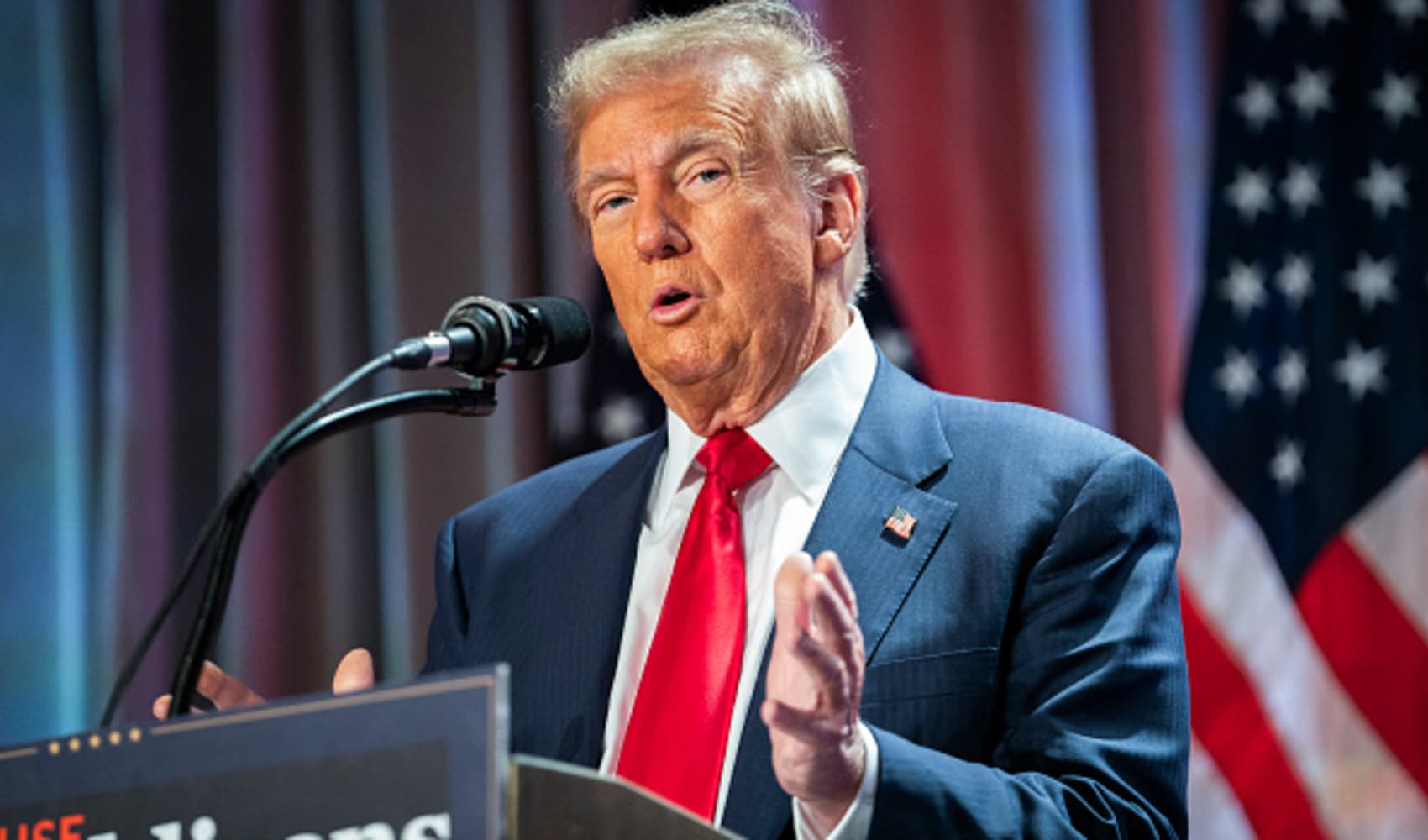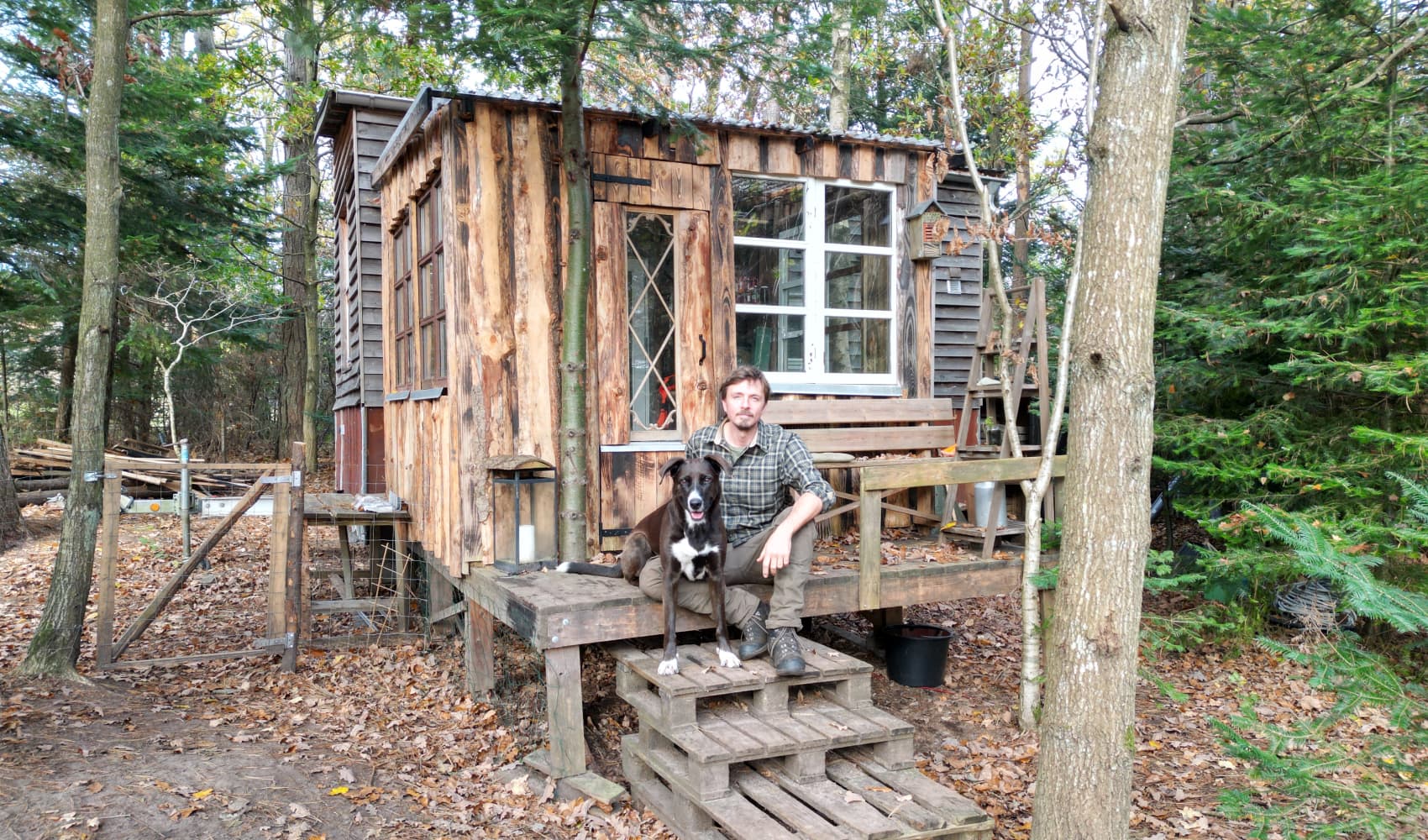
This was CNBC's live blog tracking developments on the war in Ukraine. See below for the latest updates.
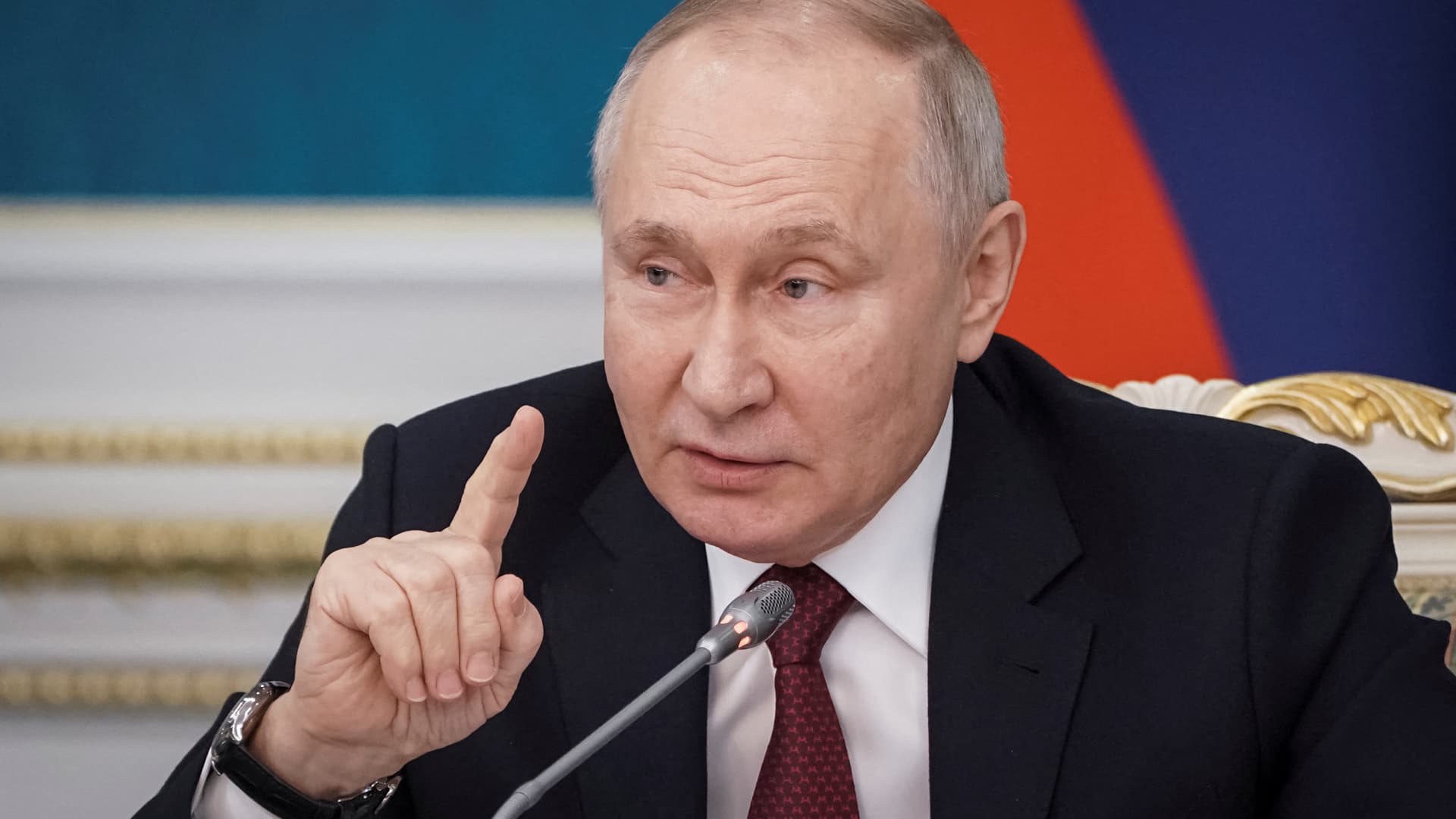
Russian President Vladimir Putin's comments on Wednesday — in which he blamed Ukraine for the lack of peace talks and claimed Russia was ready for discussions to resume — were designed to pile pressure on the West to push Ukraine back to the negotiating table, analysts said.
They noted that Putin and other Russian officials have routinely claimed the Kremlin is ready to negotiate to end the war while signaling that the Kremlin maintains its key objectives, including territorial claims and regime change in Ukraine.
We've got the news you need to know to start your day. Sign up for the First & 4Most morning newsletter — delivered to your inbox daily. Sign up here.
In other news, Finland is to close all but the most northern border crossing point with Russia in an effort to halt asylum seekers traveling to the country. It claims Russia is encouraging migrants to travel to the border. Moscow denies the allegation.
Zelenskyy wishes the U.S. a happy Thanksgiving
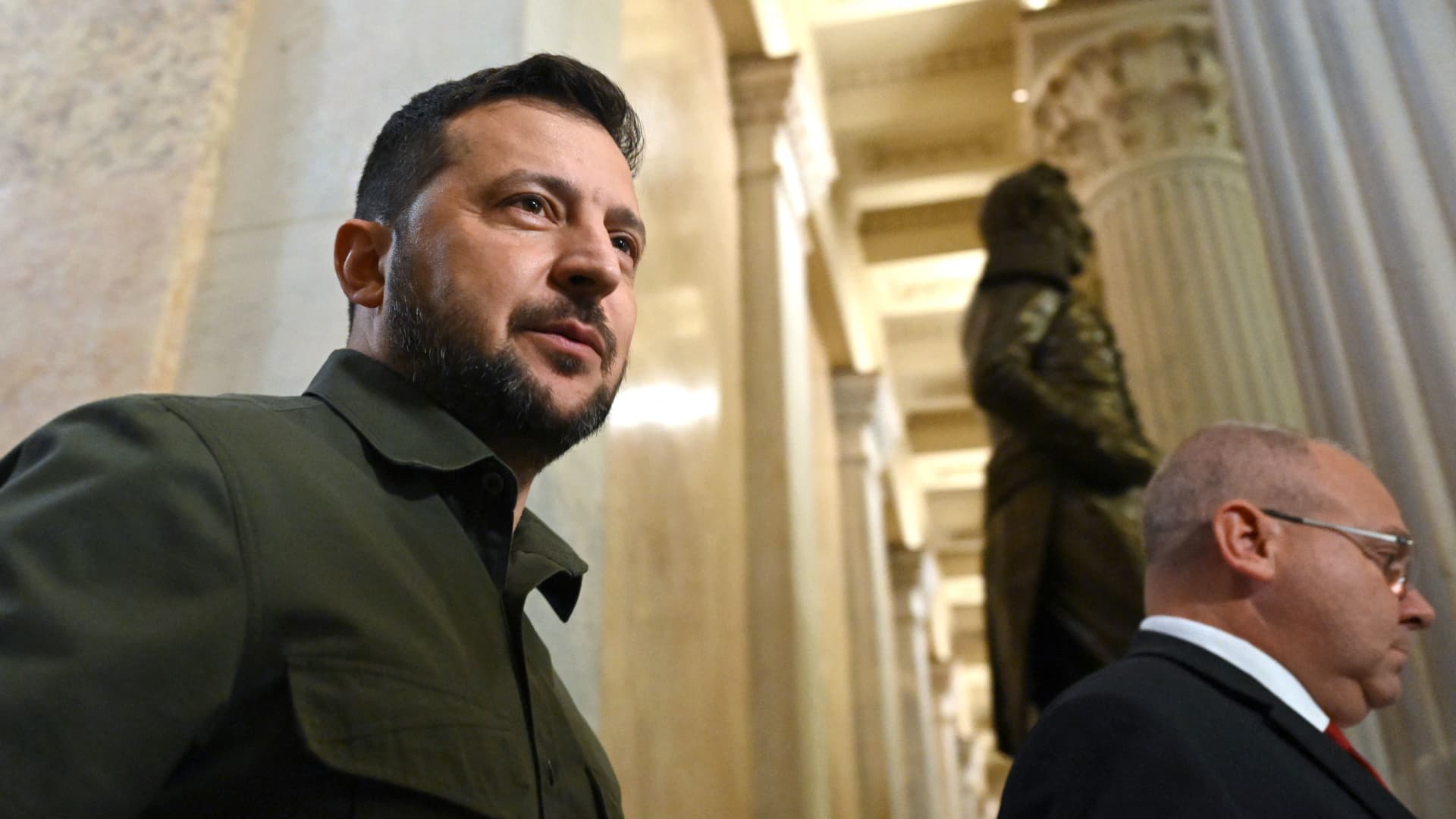
Ukrainian President Volodymyr Zelenskyy wished Americans a happy Thanksgiving holiday in a post on X, formerly known as Twitter.
Money Report
"We thank you, the people of America," Zelenskyy wrote. "We know how many of you sincerely sympathize with our struggle and wish Ukraine victory. We saw how many of you took to heart the illegal and unprovoked attack on Ukraine and felt that it was also an attack on your values."
"Freedom must not, and will not, fall. We guarantee it together," he added.
— Fred Imbert
Russia and neighbors working to combat terrorism, Putin says
Russian President Vladimir Putin said the alliance of post-Soviet states known as the Collective Security Treaty Organization (CSTO) was working together to combat terrorism.
Addressing the latest CSTO summit in Minsk, Belarus, Putin said that the counter-terrorism operation known as "Operation Mercenary," aimed at preventing citizens of the CSTO members states from travelling broad and joining "terrorist organizations," which he did not name, was working.

The CSTO is an intergovernmental military alliance consisting of Russia and a number of post-Soviet states including Armenia, Belarus, Kazakhstan, Kyrgyzstan and Tajikistan.
Azerbaijan, Georgia and Uzbekistan are former members of the organization.
Armenian Prime Minister Nikol Pashinyan did not attend the CSTO given poor relations between Moscow and Yerevan of late, following Azerbaijan's seizing of the breakaway region of Nagorno-Karabakh in September, a move that went unopposed by Russian peacekeepers in the region.
Russia labeled Armenia's decision to stay away from the CSTO summit as an anti-Russian move orchestrated by the West.
Belarus' President Aleksandr Lukashenko commented on the absence of Armenia's prime minister on Thursday, saying problems should be discussed at the negotiation table and that personal walk-outs should be avoided.
— Holly Ellyatt
Ukraine's national seed bank relocates from Kharkiv to safer place
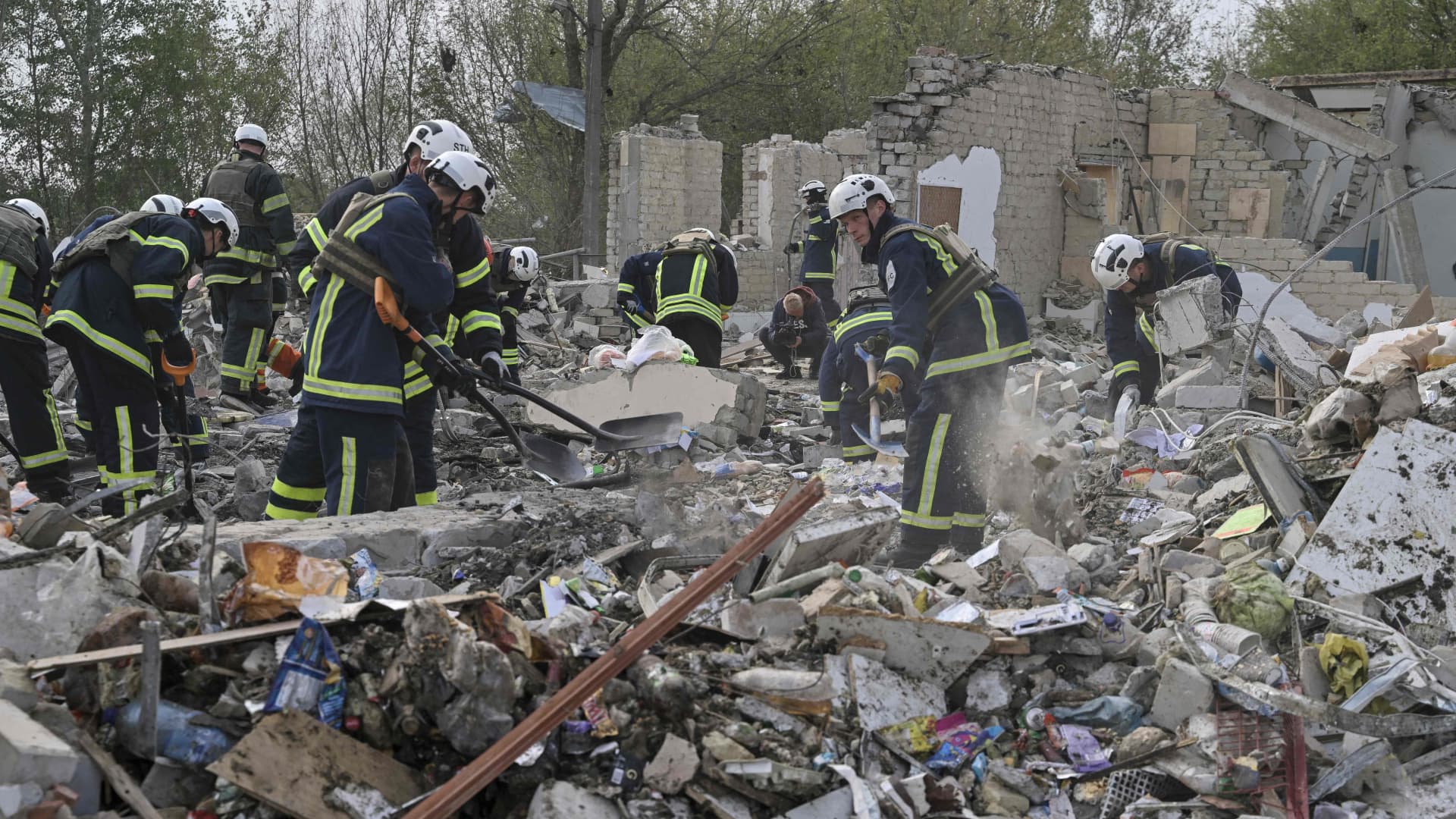
Ukraine's national seed bank, one of the world's largest, has been successfully moved from the frontline eastern city of Kharkiv to a safer location, Crop Trust, a non profit organisation said on Thursday.
Last spring, a research facility near the seed bank was damaged. That raised concerns about the preservation of the collection, the 10th largest seed collection in the world.
"As part of a year-long effort, the Ukrainian genebank system... has successfully and safely transported over 50,000 seeds from Kharkiv to a more secure location," Crop Trust, the body set up by the United Nations Food and Agriculture Organisation, said in a statement.
It gave no new location of the collection. The genebank includes many endemic seed species, some of which, including wheat and rapeseed, are important for food security.
Kharkiv is located just a few dozen kilometres from the border with Russia and the city is constantly bombarded by Russian missiles and attack drones.
— Reuters
'Europe poses a threat to Russia,' Kremlin says

The Kremlin said European NATO countries posed a threat to Russia rather than the risk emanating from Moscow.
Responding to a statement by the Czech President Petr Pavel in which he noted that NATO states perceives Russia to be the number one threat to Europe, Kremlin spokesperson Dmitry Peskov said the remark was a "hysterical" reaction.
"Russia does not pose a threat to Europe. Europe poses a threat to Russia. Europe, being a U.S.-controlled continent, I mean the EU, they are the ones who participate in NATO, which is moving with all its military might towards our borders," he said Thursday, according to comments translated by NBC News.
"This is a fact that can't be disputed, it is an obvious fact. This is what poses a threat to us. This is what makes us do what we are doing now," he said in comments to state media journalist Pavel Zarubin.
Russia has repeatedly claimed that NATO's enlargement in eastern Europe in recent decades has posed a threat to its national security, without presenting evidence to back up its claims.
— Holly Ellyatt
Norway also considering closing border point with Russia

Norway is also considering whether to close its only border crossing with Russia as anger grows over an influx of migrants trying to cross border checkpoints from Russia.
Norway's Prime Minister Jonas Gahr Store was asked at a conference Thursday whether it would be appropriate to follow the Finnish example and close the border with Russia.
"If necessary," Store replied, adding that Norway was closely monitoring the situation in Finland and Estonia, countries that also share borders with Russia.
Finland announced this week that it will close all but one of its border checkpoints with Russia, accusing the country of "instrumentalised migration" and encouraging migrants to travel to the border. Moscow denies the allegation.
Estonia has also accused Russia of bringing migrants to its border in a bid to undermine national security, calling it a "a "hybrid attack operation" this week. The Kremlin has not responded to the allegation.
— Holly Ellyatt
Russian forces still trying to encircle Avdiivka
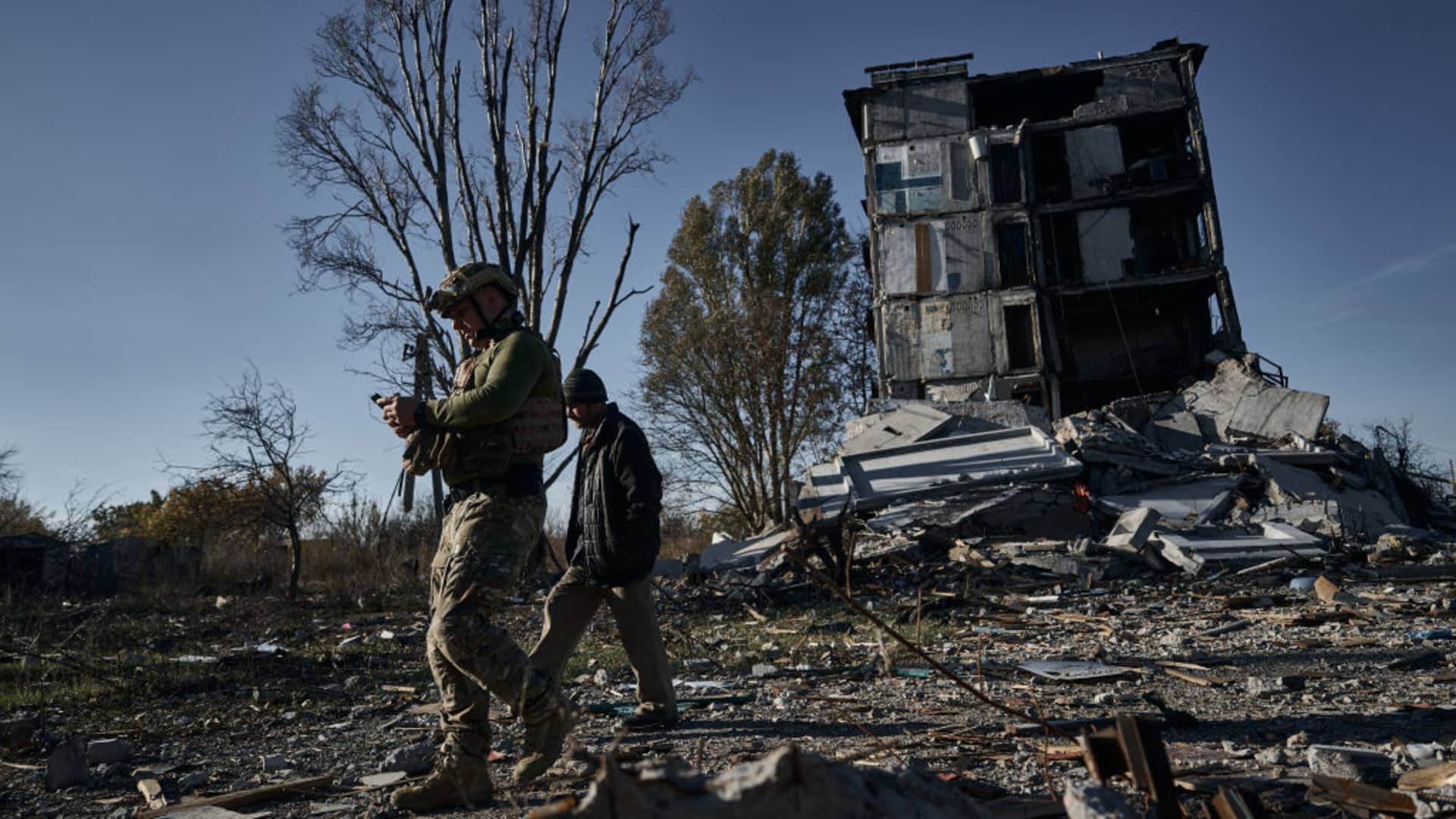
Ukraine's latest battlefield update warned that Russian forces are still attempting to encircle the embattled town of Avdiivka in eastern Ukraine, a day after suggestions that fighting could be subsiding around the town.
On Thursday, Ukraine's general staff reported that Russian troops "are still trying to encircle Avdiivka," with the town subjected to multiple attacks.
"The occupiers keep trying to encircle Avdiivka, but the Ukrainian soldiers are standing their ground, inflicting major losses on the enemy," Ukraine's military said on Facebook, adding that Ukrainian forces repelled 30 separate attacks in and around the town on Wednesday.
Avdiivka has experienced intense assaults by Russian forces in recent weeks as they try to encircle the strategically important town and its coke and chemical plant. Ukrainian military spokesperson Oleksandr Shtupun said Tuesday that Ukraine had observed fewer attacks from Russian forces and a reduction in air attacks, however.
Nonetheless, the head of Avdiivka's military administration, Vitaliy Barabash, noted that Russian forces were waiting for the weather to improve, and were regrouping in preparation for the "third wave of assault."
— Holly Ellyatt
North Korea received Russian aid for satellite launch, South Korea lawmakers claim
North Korea got help from Russia for its successful launch of a reconnaissance satellite this week, South Korean lawmakers said on Thursday, citing the country's intelligence agency.
Tuesday's launch was North Korea's third attempt after two failed tries, and the first since its leader Kim Jong Un's rare trip to Russia in September, during which President Vladimir Putin promised to help Pyongyang build satellites.

After talks between the leaders, North Korea sent data on launch vehicles used in two previous satellite launches, and Russia offered its analysis of the data, according to Yoo Sang-bum, a member of the parliamentary intelligence committee.
"Regarding the success of the third launch, the National Intelligence Service assessed that there was assistance from Russia," Yoo told reporters, citing Putin's publicly stated pledge to help with the North's launch vehicle, and the exchange of data between Pyongyang and Moscow.
North Korea's state media said on Wednesday the country's leader viewed images taken above Guam of U.S. military installations, but Yoo said it was difficult to verify whether the satellite was capable of capturing such images.
South Korea's military has said parts of a rocket salvaged following the failed second launch in May showed that it had no meaningful use as a reconnaissance satellite.
Russia and North Korea have denied arms transactions but have vowed to intensify military cooperation.
— Reuters
Wagner mercenaries 'rehabilitated' as war veterans, UK says
A select group of mercenaries belonging to the Wagner Group private military company were issued with official veteran identification documents earlier in November, showing signs that the private military company is undergoing a kind of "rehabilitation" in the eyes of the Russian defense ministry, the U.K. noted Thursday.
The move to recognize the service of Wagner personnel marks the first time they have been officially recognised as veterans, the U.K.'s Ministry of Defence said in an intelligence update on X, formerly known as Twitter.
After the death of founder and leader Yevgeny Prigozhin in a plane crash in late summer, following an ill-fated rebellion against the defense ministry, the Wagner Group has been somewhat adrift as the Russian defense ministry looked to integrate it into its apparatus.
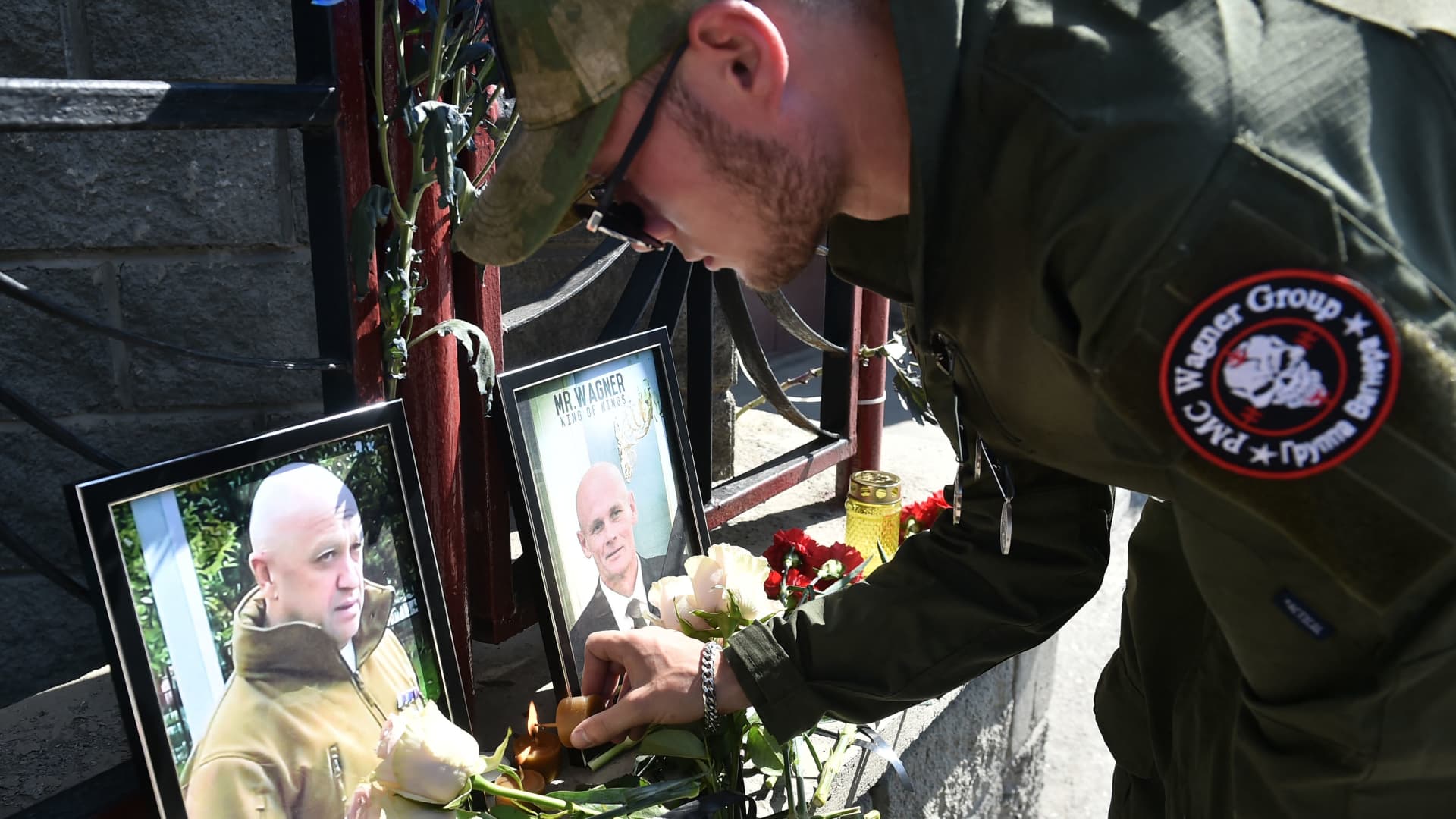
The Wagner Group was recently subsumed into Russia's National Guard (Rosgvardia) command structure, the U.K. noted.
Now, the U.K. added, "the Russian Ministry of Defence has established a new system allowing Wagner veterans to receive veteran identification documents and commensurate bonuses ... This highly likely signals the rehabilitation of some Wagner elements by the Russian administration."
The move, it said, follows a long period of uncertainty on how the administration would regard Wagner personnel in the wake of the Wagner Group's "mutiny" in June 2023.
— Holly Ellyatt
Putin peace talk comments designed to pressure West, analysts say
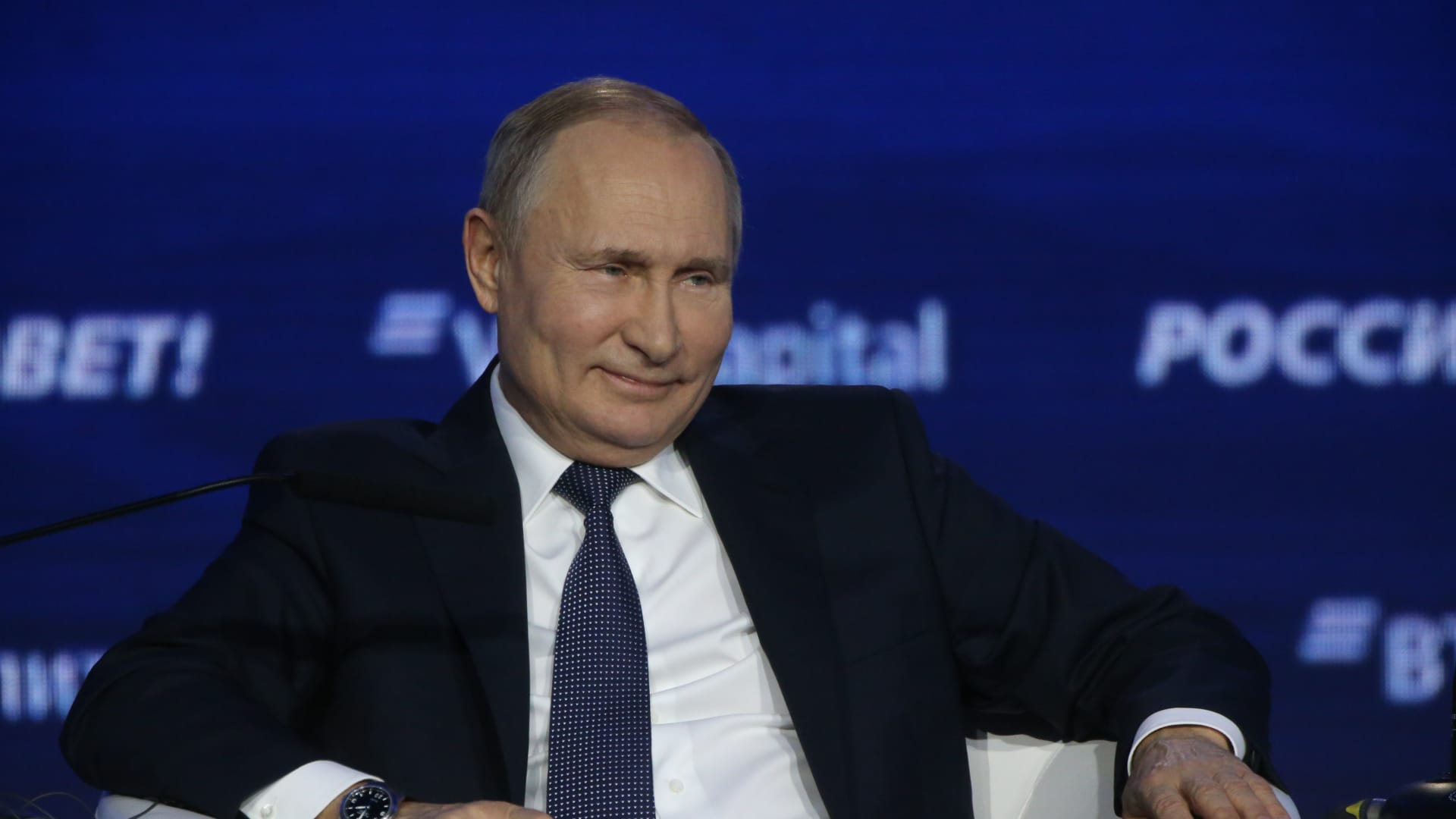
Analysts say Russian President Vladimir Putin's comments Wednesday regarding peace talks with Ukraine were likely aimed at piling pressure on the West to push Ukraine toward the negotiating table with Russia.
Addressing the G20's virtual summit on Wednesday, Putin blamed Ukraine for the lack of peace talks to end the war, claiming Russia was ready to return to the negotiating table. Analysts said the conciliatory tone of the comments was designed to pressure the West into pushing Kyiv to negotiate with Russia.
"Putin ... reiterated boilerplate rhetoric falsely portraying Russia as willing to engage in meaningful negotiations, likely to pressure the West into prematurely pushing Ukraine to negotiate with Russia," analysts at the Institute for the Study of War think tank said Wednesday.
The ISW noted, however, that Putin and other Russian officials have routinely falsely claimed that the Kremlin is ready to negotiate to end the war while signaling that the Kremlin maintains its maximalist objectives, including territorial claims and regime change.
"Kremlin officials have pushed this narrative while claiming that Ukraine is unwilling to negotiate with Russia, likely to coerce Western officials into prematurely offering concessions favorable to Russia rather than engage in meaningful, good faith negotiations."
The ISW said it "has observed no indications that Putin does not retain his maximalist objectives and continues to assess that a premature cessation of hostilities in Ukraine greatly increases the likelihood of renewed Russian aggression on terms far more favorable to the Kremlin in the near future."
Ukraine has said it's willing to negotiate with Russia as soon as Russia removes its forces from Ukraine's internationally recognized territory, including regions it claims to have annexed.
— Holly Ellyatt
Ukraine welcomes Western allies' air defense coalition
President Volodymyr Zelenskyy and his defense minister welcomed the formation by Ukraine's Western allies on Thursday of a 20-nation "coalition" to boost air defenses, seen as a key element in the country's campaign against Russian forces.
Zelenskyy said the group, one of several devoted to specific areas of Ukraine's defence, was formed at a virtual meeting of the "Ramstein group" examining Ukraine's military needs.
Germany's Defense Ministry had earlier announced the formation of the group in a posting on X, formerly Twitter, with Germany and France taking on leading roles.
"Thanks to every country participating in these efforts for enabling our cities and villages to be better protected against Russian attacks," Zelenskyy said in his nightly video address.
"Not everything can be disclosed publicly at this time, but the Ukrainian air shield is becoming stronger every month."
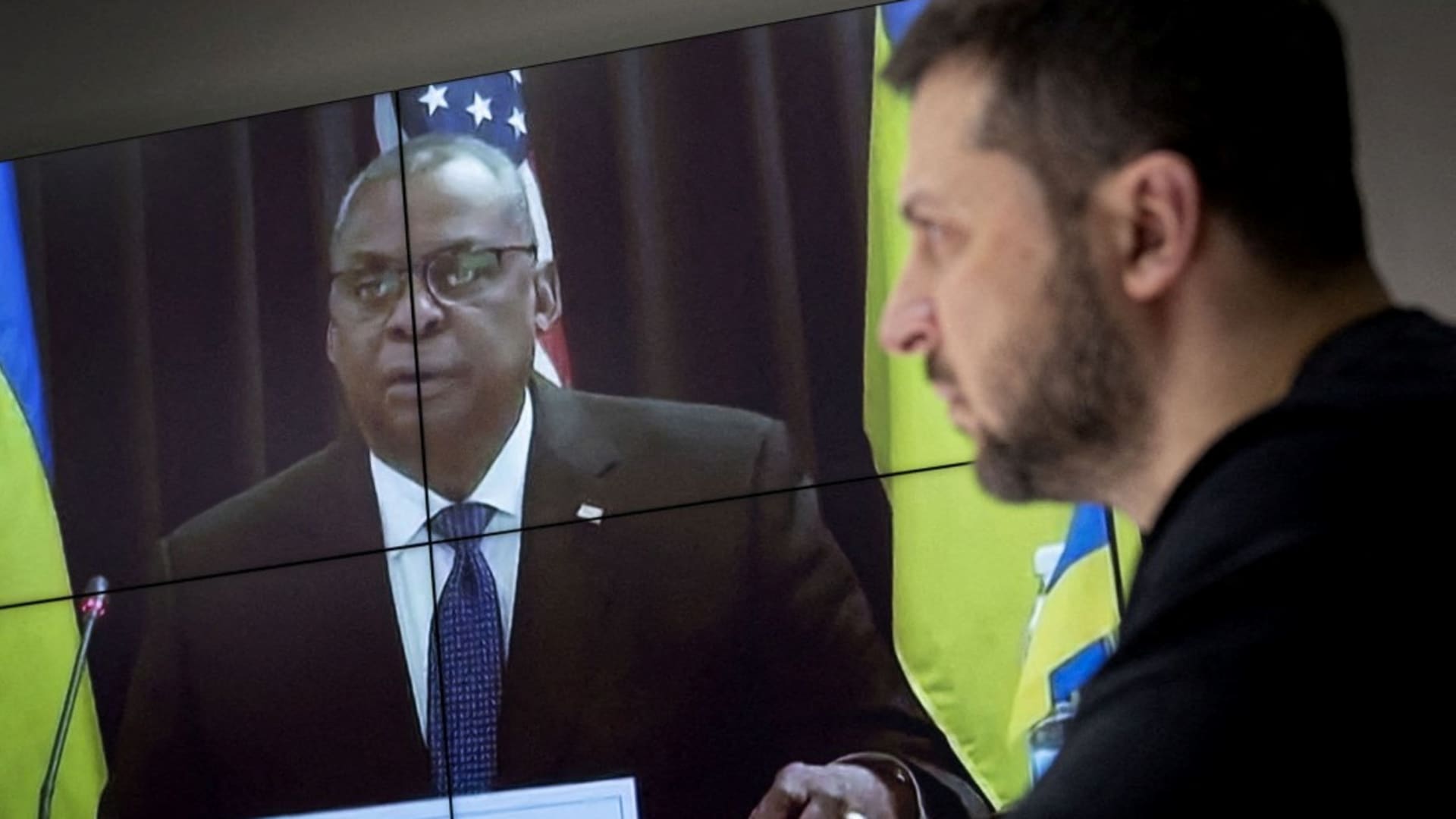
Defense Minister Rustem Umerov also noted other assistance agreed by participants, including a German air defense package announced this week during a visit to Kyiv by Defense Minister Boris Pistorius. Also noted were a Dutch package and Estonian financing for help with information technology.
Ukraine's military commander-in-chief, General Valery Zaluzhnyy, said on Telegram that he had taken part in the meeting for the first time, describing the situation along the 1,000-km (600-mile) front as "complicated but controllable."
— Reuters
Finland to close all but one border crossing point with Russia
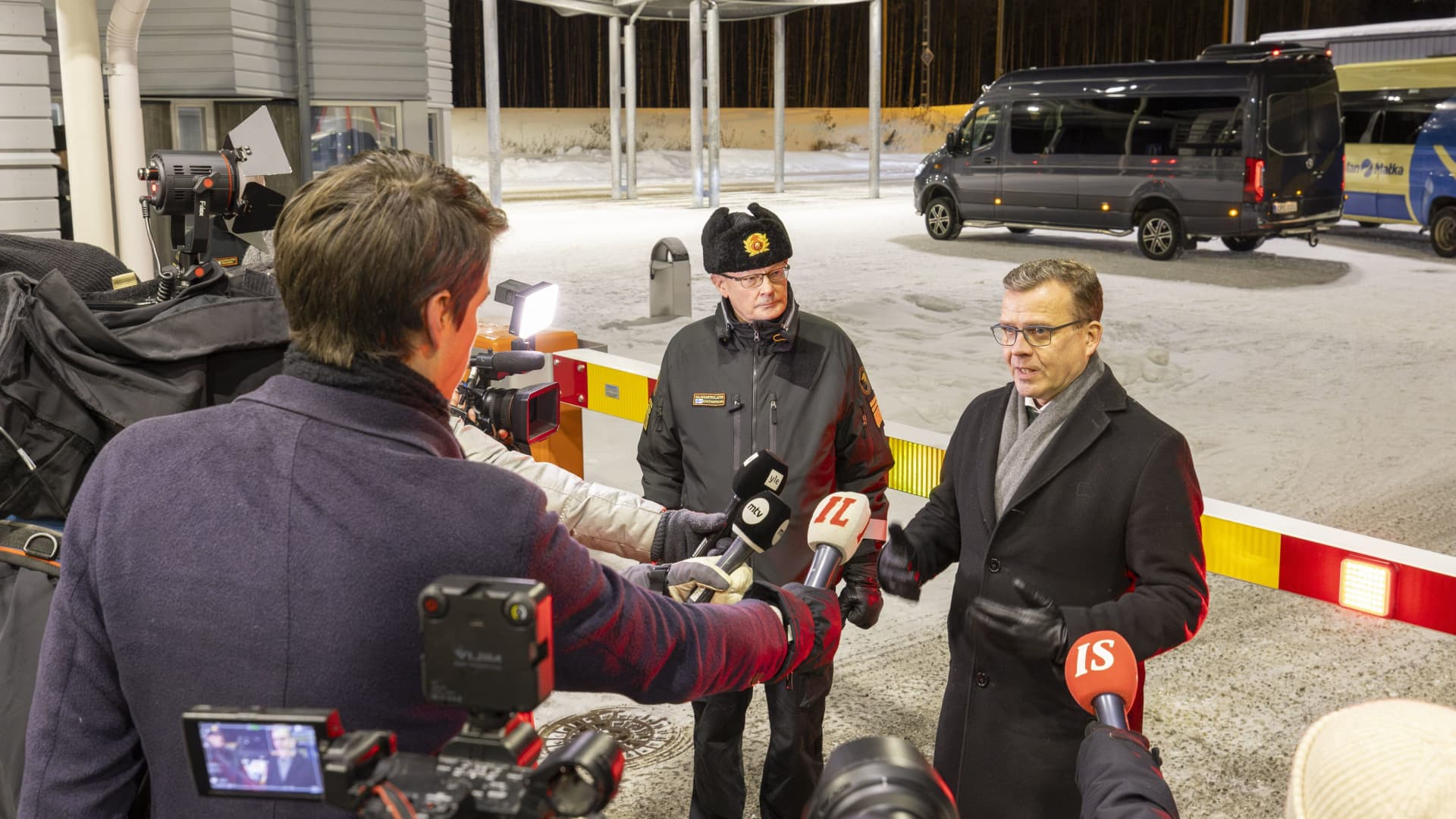
Finland is to close all but the most northern border crossing point with Russia in an effort to halt asylum seekers traveling to the country, which it claims Russia is encouraging.
Border crossing points of Kuusamo, Salla and Vartius at the eastern border with Russia will close at midnight on Friday, leaving only the border crossing point of Raja-Jooseppi open. Being the northernmost crossing on its border with Russia, it's seen as harder to reach. The decision will remain in force until Dec. 23.
Finland said it had made the decision in light of "instrumentalised migration from Russia." It said "the escalation of the situation [poses] a serious threat to national security and public order."
Since the beginning of August, about 700 third-country nationals have arrived in Finland without a visa via the border crossing points at the eastern border. They have then applied for asylum in Finland, the government said in a statement.
"According to the observations made and information received by the Border Guard and other authorities, it is clear that foreign authorities and other actors have played a role in facilitating the entry of persons crossing the border into Finland," the statement said.
"The Russian authorities are allowing this to happen, which is a change from their earlier procedures. The situation also involves international crime," it added.
Earlier this week, Kremlin spokesperson Dmitry Peskov denied Finland's accusation that Russia was deliberately pushing illegal migrants toward the border. Estonia has also accused Russia of bringing migrants to its border in a bid to undermine national security, calling it a "a "hybrid attack operation" this week. The Kremlin has not responded to the allegation.
— Holly Ellyatt
Photos show Kyiv covered in Snow as war rages on
Photos published via Getty Images on Wednesday show Ukraine's capital Kyiv covered in snow as daily life continues amid Russia's full-scale invasion.
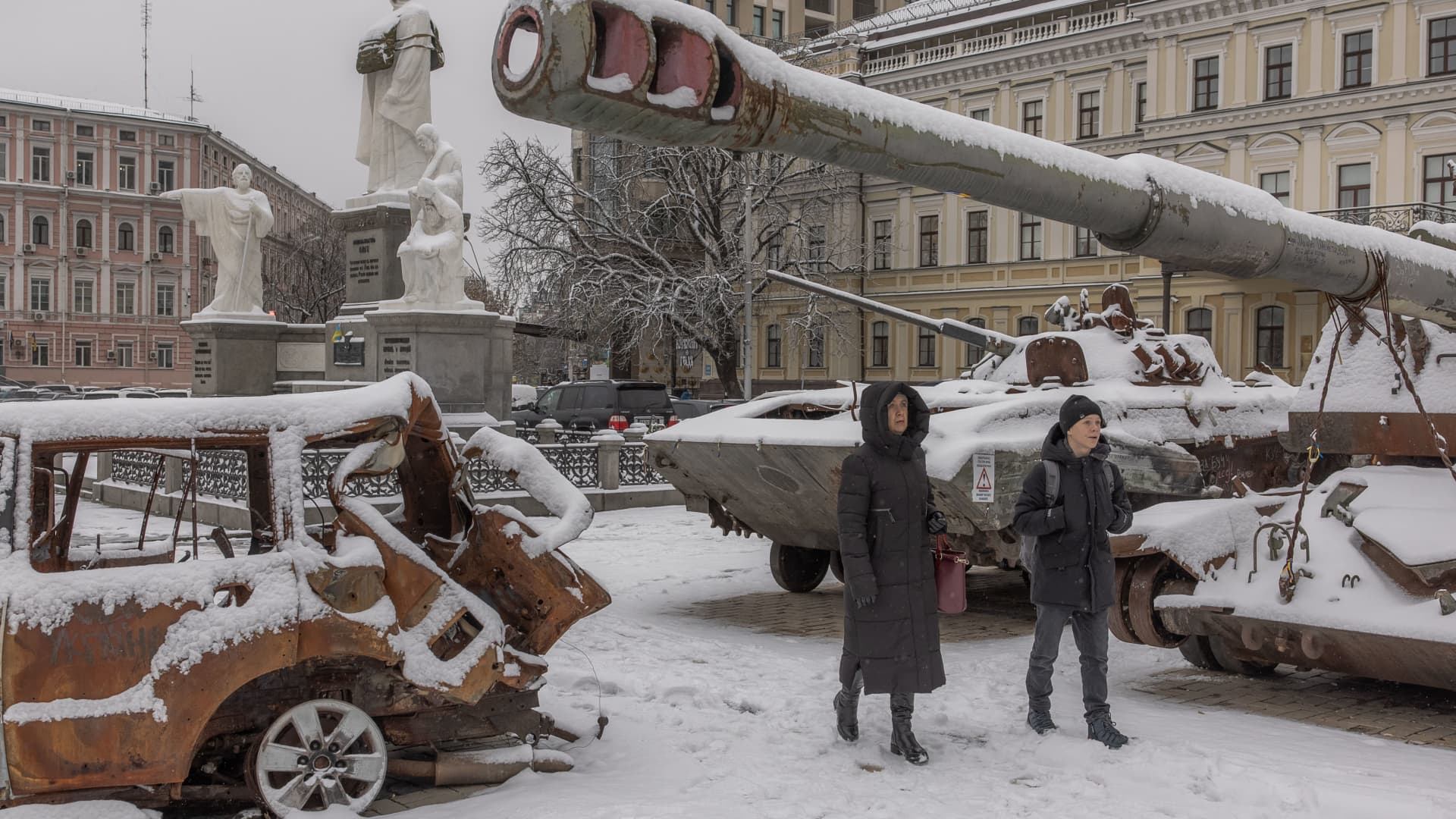
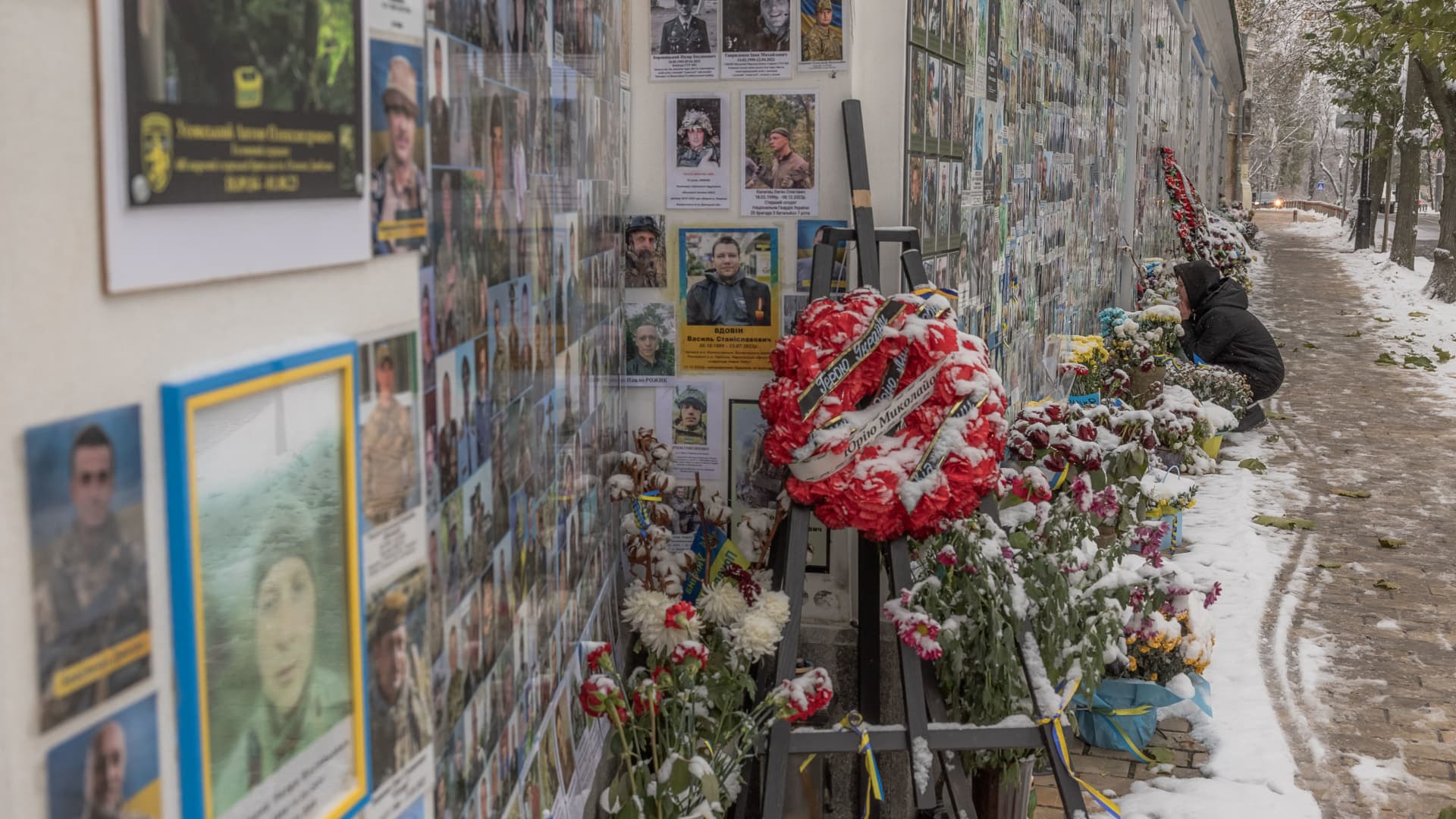
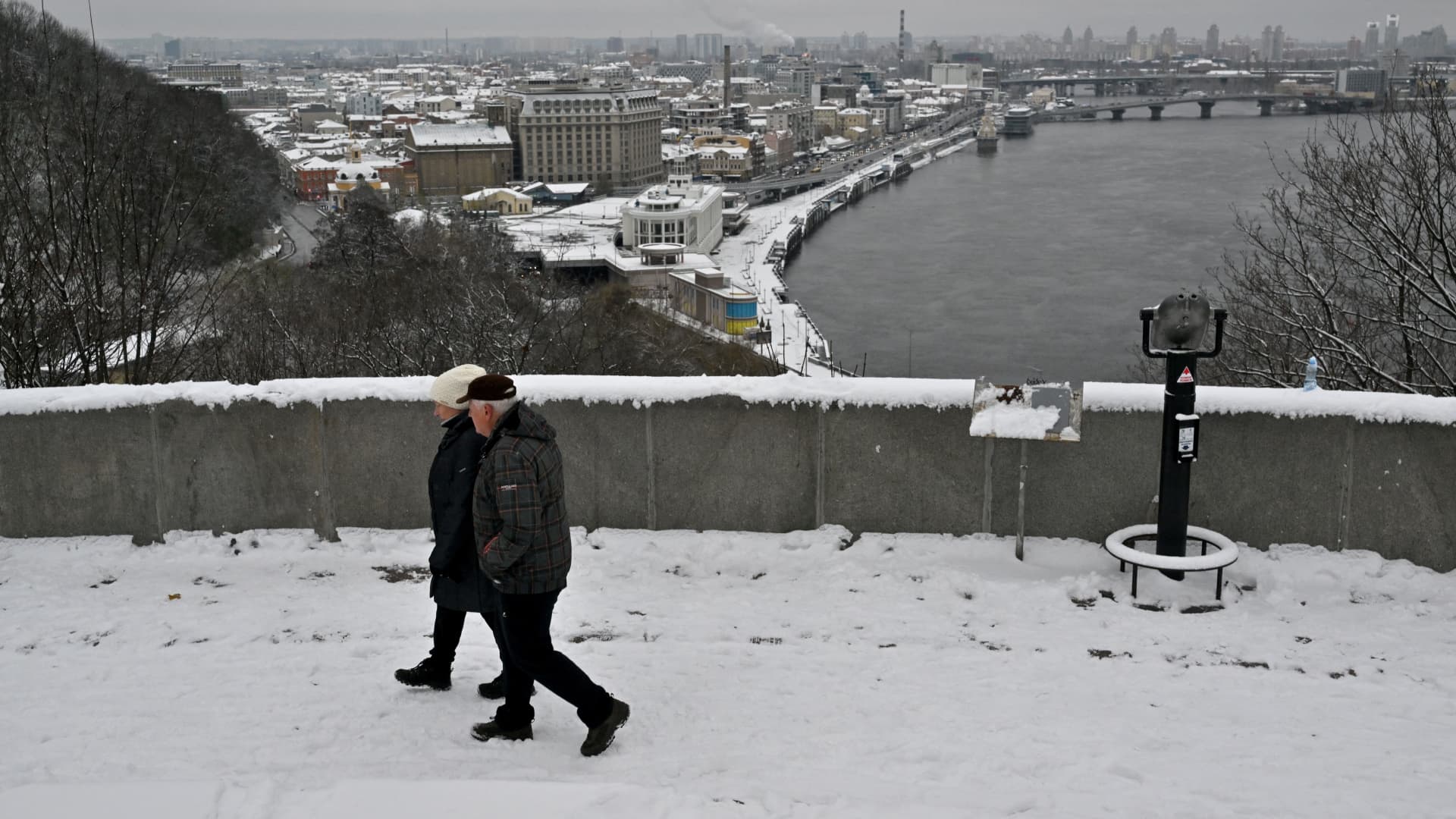
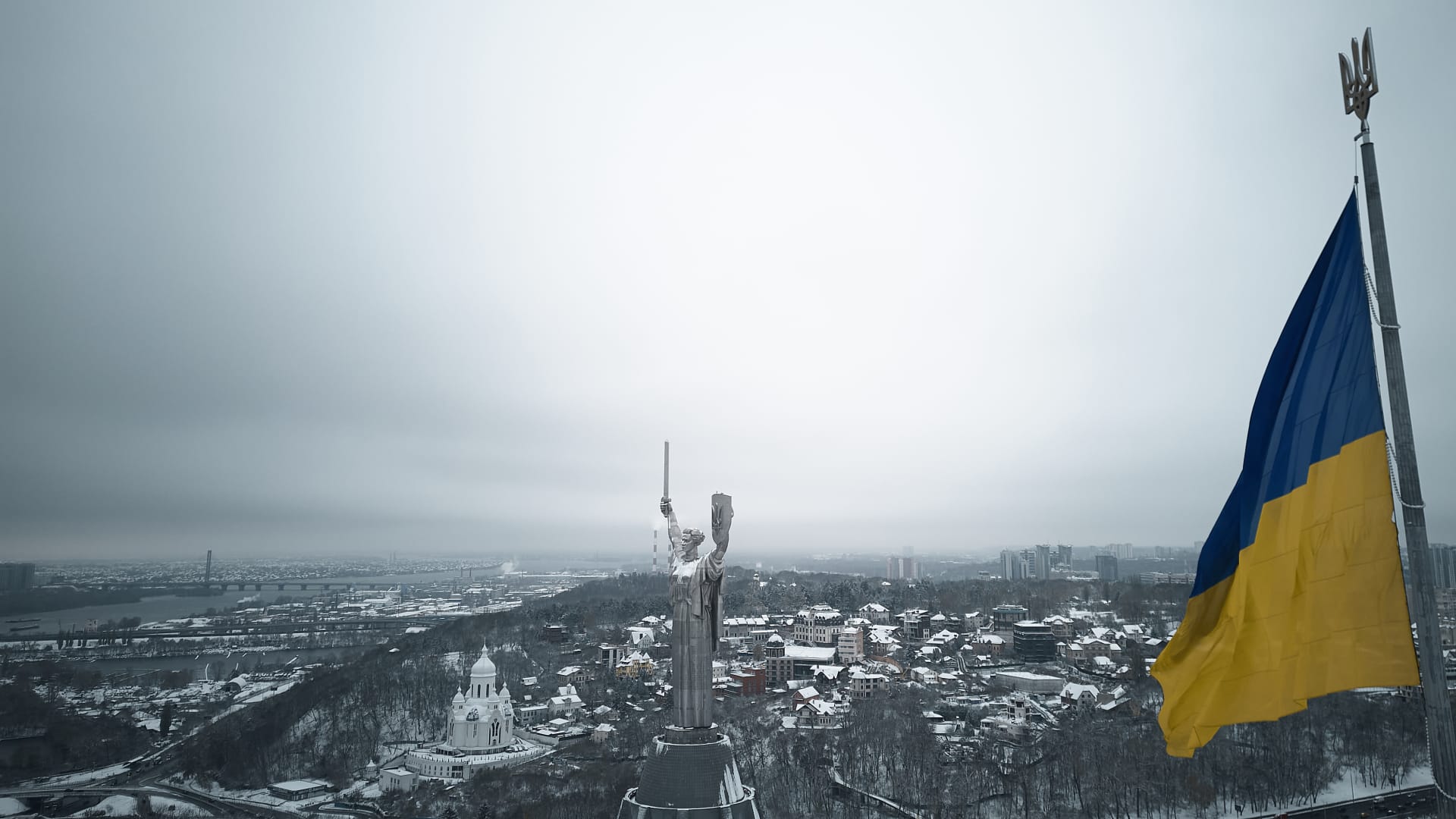
— Sophie Kiderlin
Putin says war in Ukraine is a 'tragedy'
Russian President Vladimir Putin said the Group of 20 (G20) nations has to think about ways to stop the war in Ukraine, describing it as a "tragedy."
Addressing the virtual G20 summit hosted by India on Wednesday, Putin said that Russia had never refused to participate in peace talks with Ukraine, according to comments reported by news agency TASS.
Instead, Putin once again blamed Ukraine for previous peace talks failing, and then claimed there is a law in Ukraine prohibiting discussions.
"Of course, we must think about how to stop this tragedy. By the way, Russia has never refused peace negotiations with Ukraine; it was not Russia, but Ukraine that publicly announced that it was withdrawing from the negotiation process. And moreover, it was a decree, a decree of the head of state, was signed prohibiting such negotiations with Russia," Putin said, TASS reported.
Putin used the word "war" to describe the conflict in Ukraine, diverging from Moscow's usual mantra of calling the invasion a "special military operation." He said: "I understand that this war can't help but be shocking. But the bloody coup in Ukraine in 2014, which was followed by the Kyiv regime's war against its own people in Donbas - is that not shocking?"
Russia claims a 2014 uprising against the then pro-Russian leadership in Ukraine was a "coup" orchestrated by foreign countries. The uprising acted as a catalyst for Ukraine's deeper split from Russia, after which Moscow supported pro-Russian separatists in eastern Ukraine, a region known as Donbas.
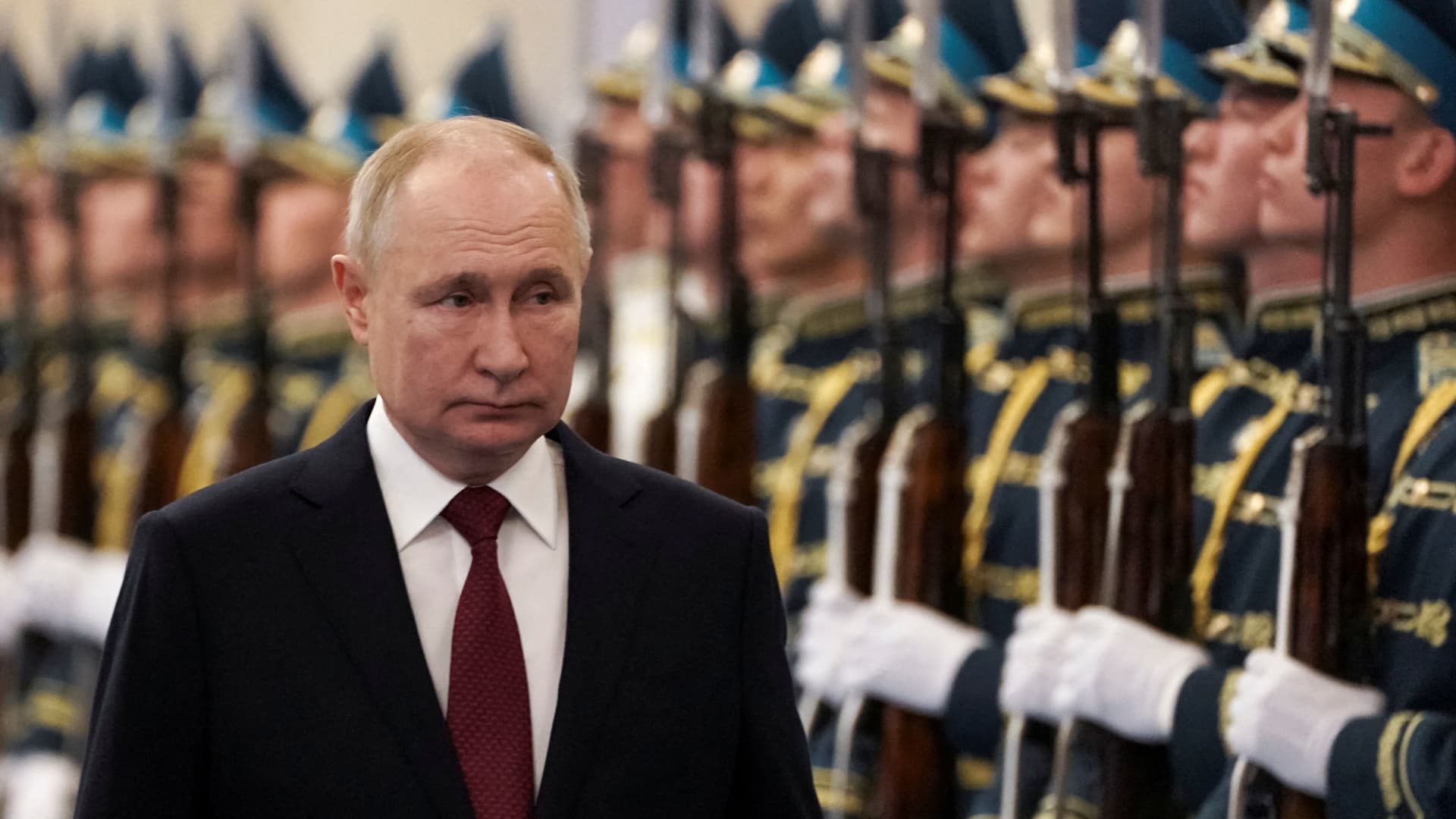
Russia invaded Ukraine in February 2022 but has invariably blamed Ukraine and NATO for the war, claiming the West wanted to inflict a "strategic defeat" on Russia, without presenting evidence. NATO countries, which have provided Ukraine with military, financial and humanitarian aid, say they are helping Ukraine to defend its sovereignty and territorial integrity.
Russia remains a member of the G20 although it was kicked out of the smaller, more exclusive G8 back in 2014 after it invaded and annexed Crimea.
Kyiv has previously attended peace talks with Russia but these failed and since then both sides have hardened their stances and cemented "red lines" preventing any peace deal. Ukraine has said negotiations won't restart while Russian troops are on its territory.
— Holly Ellyatt
'Confused' infantry combat on east bank of the Dnieper river
The U.K.'s Ministry of Defence described fighting between Russian and Ukrainian forces on the east (or left) bank of the Dnieper river as "confused" and taking place in a "complex" terrain.
In an intelligence update on X, formerly known as Twitter, the ministry said that fighting has continued around the village of Krynky where Ukrainian marines maintain a bridgehead on the east bank of the Dnieper river. Ukraine and Russia confirmed last week that units had crossed the river and established several footholds on the east bank, the side of the river occupied by Russian forces.
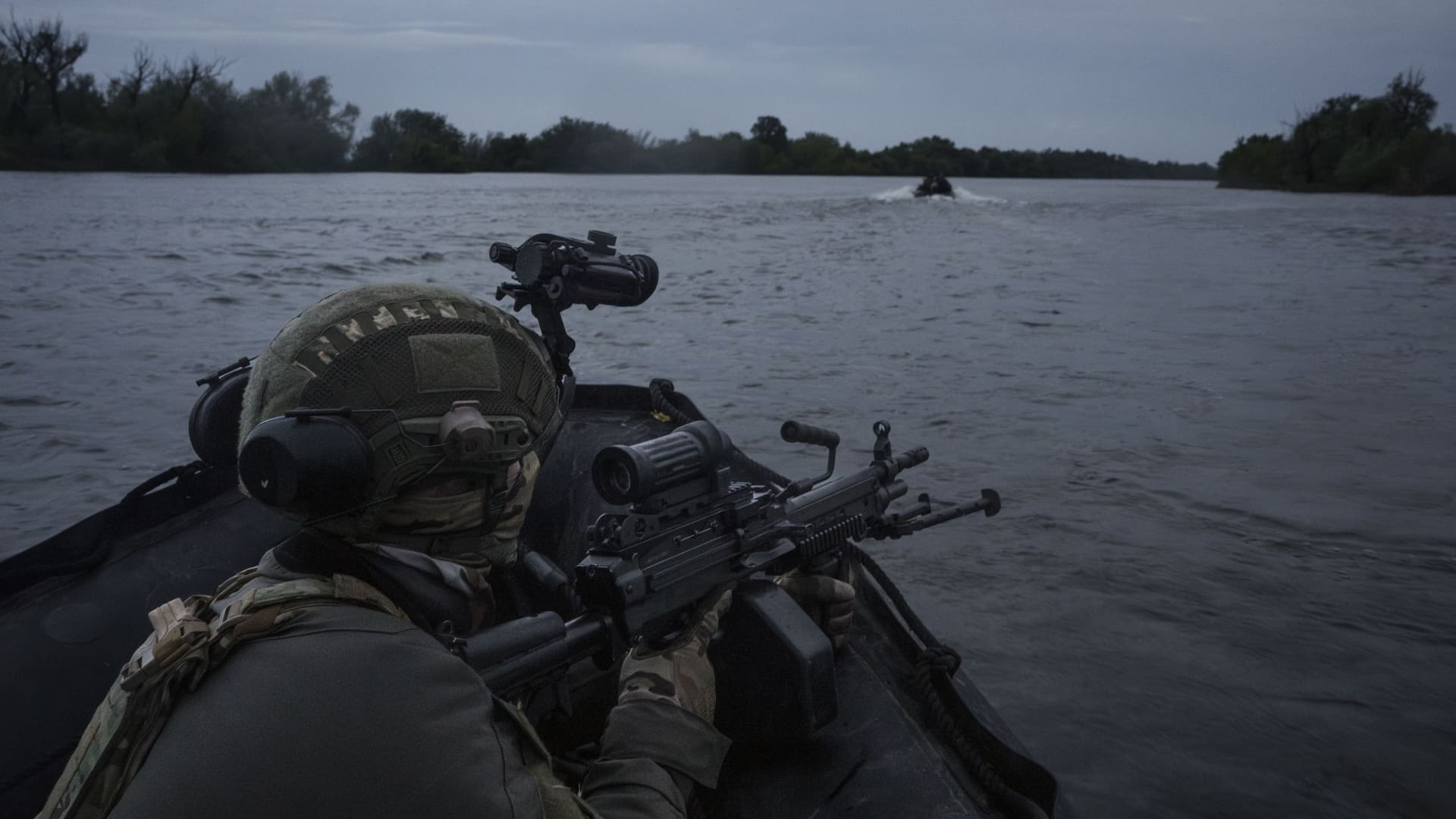
Since then, fighting has been concentrated around several villages, including Krynky.
"The ground fighting has been characterised by confused, dismounted infantry combat and artillery exchanges in complex, wooded terrain," the U.K.'s defense ministry said Wednesday.
"Ukraine has made particularly effective use of small attack uncrewed aerial vehicles, while the Russian Air Force is conducting significant numbers of sorties in support of frontline troops, predominantly launching munitions from beyond the range of Ukraine's air defences."
The ministry noted that, while the fighting around Krynky is on a smaller scale than some major battles of the war, it "will be considered highly unfortunate by Russian leaders."
"Russia withdrew from the west bank of the Dnipro River a year ago, almost certainly aiming to hold Ukrainian forces west of the river, keep the sector quiet, and free up Russian forces elsewhere."
— Holly Ellyatt
Kremlin declines to comment on suggestion that Russia may get ballistic missiles from Iran
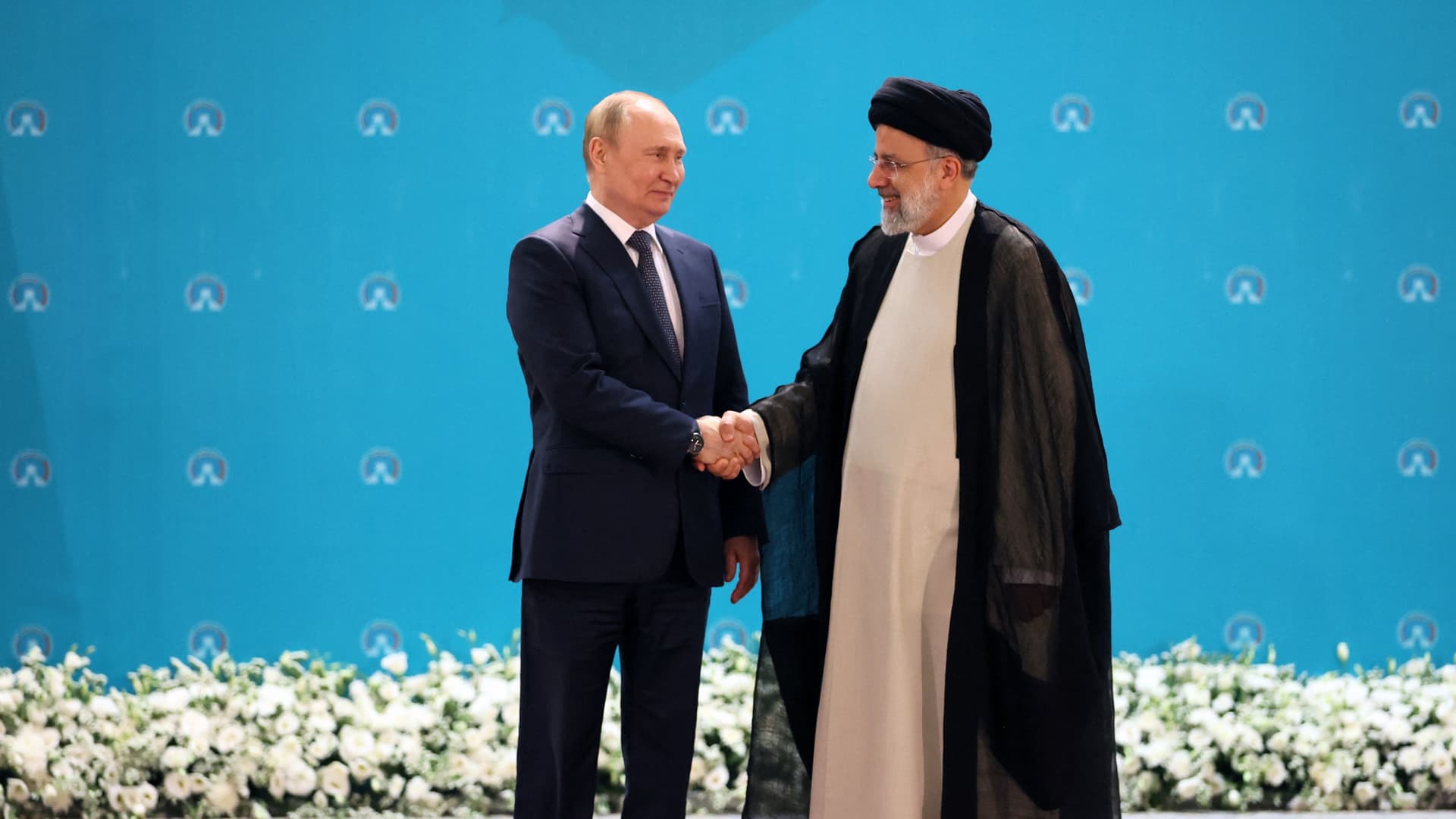
The Kremlin declined on Wednesday to comment on a suggestion by White House spokesman John Kirby that Iran may be considering providing Russia with ballistic missiles for use in Ukraine.
"We are developing relations with Iran, including in the field of military-technical cooperation, but we do not comment on this information," Kremlin spokesman Dmitry Peskov told reporters in a regular news briefing.
Kirby said the United States would monitor the situation between Iran and Russia, and take appropriate action as needed.
— Reuters
Read CNBC's previous live coverage here:
Putin calls war a 'tragedy'; Moscow claims Ukraine is seeing 'colossal losses' after crossing river


